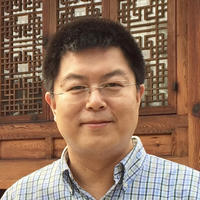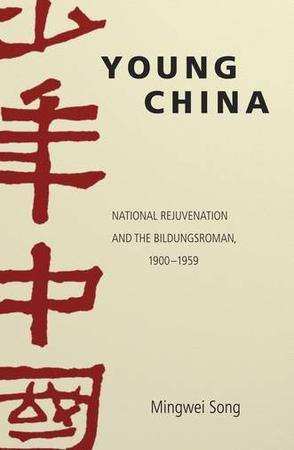
Curriculum Vitae
msong2@wellesley.edu
(781) 283-3588
East Asian Languages & Cultures
B.A., Shandong University; M.A., Fudan University; Ph.D., Columbia University
GRH 236A
Mingwei Song
Professor of ChineseSpecializing in modern Chinese literature and intellectual history, science fiction, youth culture, posthuman theories, and the Neo-Baroque aesthetics
President of ACCL(Association of Chinese and Comparative Literature)
I am a scholar of literature whose research interests range across modern Chinese literature, intellectual history, comparative literature, and literary theory. My past research projects include contemporary Chinese science fiction, the discourse of youth and the Bildungsroman in late Qing and Republican China, and the life and work of Eileen Chang. My current research project focuses on the posthuman and the “Neo-Baroque” in contemporary Sinophone fiction.
I have been researching Chinese science fiction since 2008. I was one of the first scholars to pay attention to and closely examine what I named the “new wave” of Chinese science fiction that first emerged at the beginning of the twenty-first century. My most recent monograph is Fear of Seeing: A Poetics of Chinese Science Fiction (Columbia University Press, 2023). I also published a book in Chinese: The New Wave in Chinese Science Fiction: History, Poetics, Text 中國科幻新浪潮:歷史,詩學,文本 (2020). In 2012, I edited a special issue for Renditions that translated stories by authors such as Liu Cixin and Han Song into English for the first time. In 2018, I co-edited The Reincarnated Giant: An Anthology of Twenty-First-Century Chinese Science Fiction (Columbia University Press, 2018).
I began my academic career with a study in Eileen Chang in my senior year at Shandong University, which led to the publication of my first book, The Sorrows of a Floating World: a Biography of Eileen Chang 浮世的悲哀: 張愛玲傳, in 1996 (reprinted in 1998; a third edition forthcoming in 2023). My first monograph in English, Young China: National Rejuvenation and the Bildungsroman, 1900-1959 (Harvard 2015), is based on a Ph.D. dissertation that I completed at Columbia. My other major publications include a volume of critical essays, Criticism and Imagination: Collected Literary Critical Essays (Fudan University Press, 2013), and two collections of my literary essays: Delmore’s Gift: A New York Notebook (Shanghai Bookstore Press, 2006) and Last Year, A Rose in Plymouth: A New England Notebook (Shanghai Bookstore Press, 2012). In 2019, David Der-wei Wang and I edited a volume, May Fourth@100: Culture, Thought, History (Taipei: Linking, 2019), to commemorate the centennial of May Fourth Movement.
I published poems in literary magazines in Chinese, with seven translated into Italian and fourteen into English. I co-authored a collection of poetry, White Horse and Black Camel 白馬與黑駱駝, with the Taiwanese writer Lo Yichun 駱以軍 (Taipei’s Ryefield in 2022). Two poems that have been translated into English recently appeared in Asymptote.
My major grants include the An Wang Postdoc Fellowship from the Fairbank Center at Harvard University in 2005-06, a fellowship from the Chiang Ching-kuo Foundation for International Scholarly Exchange in 2010-2011, and the Elizabeth and J. Richardson Dilworth Fellowship offered through the Institute for Advanced Study (Princeton) in 2016.
At Wellesley, my course offering covers a variety of topics in modern Chinese literature and culture, ranging from urban studies to popular culture to posthuman studies. I have been actively working on the development and reform of both the departmental and college-wide curriculum and I have been particularly involved in building interdepartmental collaborations. While my teaching tasks at Wellesley have included undergraduate courses on all levels, I have also continuously devoted time to guest lecturing and mentoring graduate students at research universities in the United States, Europe, and Asia. I am serving as Ph.D. co-adviser to students at both Harvard and Uppsala University in Sweden.
See my Publications page for additional information.
 |
Fear of Seeing: A Poetics of Chinese Science Fiction. Columbia University Press, 2023. 384 pages. |
 |
White Horse and Black Camel 白馬與黑駱駝 (Collection of poems; co-authored with Lo Yichun 駱以軍). Taipei: Ryefield, 2022. 262 pages.
|
 |
New Wave of Chinese Science Fiction: History, Poetics, Text 中國科幻新浪潮:歷史,詩學,文本. Shanghai: Shanghai Literature & Arts Publishing House, 2020. 311 pages.
|
 |
May Fourth@100: Culture, Thought, History. 五四@100: 文化,思想,歷史(co-edited with David Der-wei Wang). Taipei: Linking Publishing Company, 2019. 335 pages. |
 |
The Reincarnated Giant: An Anthology of Twenty-First-Century Chinese Science Fiction (co-edited with Theodore Huters). Columbia University Press, 2018. 488 pages. |
 |
Science Fiction for Children. 給孩子的科幻故事. Shanghai: Oriental Publication Center. July 2018: 324 pages. |
 |
Young China: National Rejuvenation and the Bildungsroman, 1900-1959. Harvard University Asia Center, 2015. 379 pages. |
 |
Criticism and Imagination 批評與想像. Shanghai: Fudan University Press, 2013. 248 pages |
 |
Last Winter, a Rose in Plymouth: a New England Notebook 普利茅斯的冬日花朵:新英格蘭記. Shanghai: Shanghai Bookstore Publishing House, 2012. 191 pages. |
 |
Delmore’s Gift: a New York Notebook 德爾莫的禮物: 紐約筆記本. Shanghai: Shanghai Bookstore Publishing House, 2007. 178 pages. |
 |
The Masterpieces of the Twentieth Century World Literature 二十世紀文學藝術明珠. Haikou: Hainan Press, 1999. 174 pages |
 |
The Sorrows of a Floating World: a Biography of Eileen Chang 浮世的悲哀: 張愛玲傳. Revised & enlarged edition, Shanghai: Shanghai Literature & Arts Publishing House, 1998. 329 pages. |
 |
The Sorrows of a Floating World: a Biography of Eileen Chang 浮世的悲哀: 張愛玲傳. Taipei: Yeqiang Publishing House, 1996. 309 pages |
